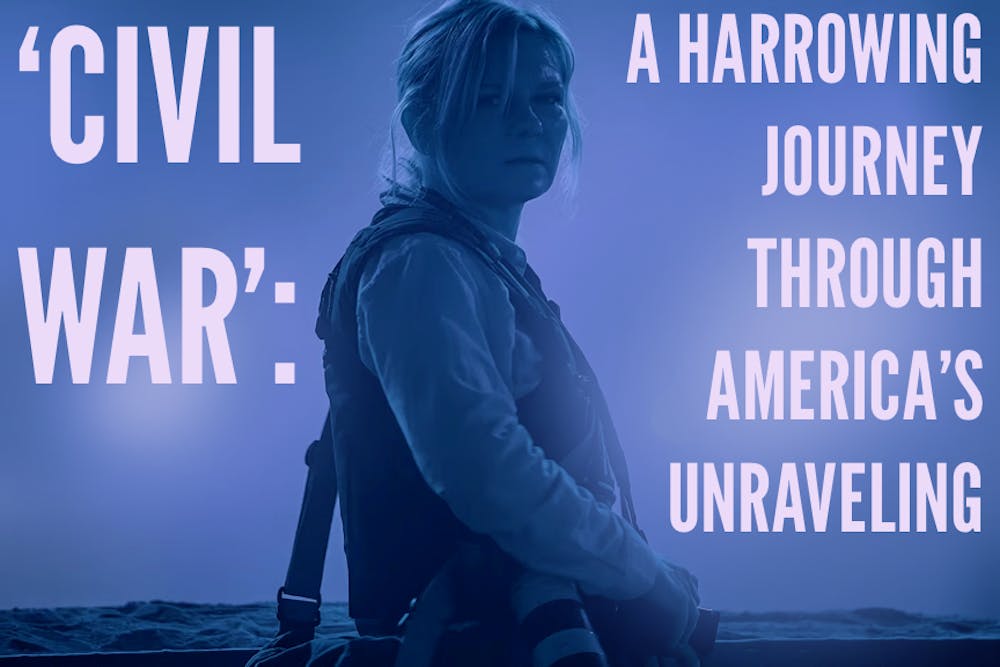When I first heard about Alex Garland’s “Civil War,” I was highly skeptical. An apolitical take on a potential second American Civil War sounded like a joke, not a real movie with A24’s largest budget to date. I thought Alex Garland was a cowardly Brit who was too scared to say anything meaningful about contemporary American politics. But I was completely wrong about him and this movie. “Civil War” is a thrilling and brilliant film about a country torn asunder by incomprehensible polarization and the efforts of journalists to seek the truth amidst the chaos.
“Civil War” spends very little time explaining its titular conflict or the beliefs of the two sides. But this sparse world-building and political ambiguity is not a bug; it's a feature. The film’s refusal to give exact causes and clear sides that audiences can align with is powerfully unsettling. It allows the film to transcend typical partisan bickering and explore war’s elemental truths and visceral effects. If you want agitprop and validation of your political views, you will not find it here.
“Civil War” instead focuses on the efforts of a quartet of journalists — Lee, Joel, Jessie, and Sammy — who travel to D.C. to interview the president. The film cleverly follows the narrative structure of a road trip film, with our characters running into all kinds of situations and locales on their way to the capital. These vignettes effectively illustrate the war by showing the breakdown in order and trust. Vigilantes torture looters outside gas stations, relief camps are densely populated with displaced citizens and rogue white nationalists take advantage of the chaos for racial terrorism. It’s all disturbing to watch, and the lack of clear answers engulfs you in a highly affecting malaise. The film incisively posits that the eventual endgame of our current polarization is vague chaos. Allies and enemies will become unclear as we become overly entrenched in our views. As a result, there’s no excitement or pride to be had in this war — just a deep sadness and confusion as a country plunges into darkness.
Beyond the political commentary, the film is a thoughtful meditation on the desensitization of violence and the mental toll of journalism. Lee is a legendary photojournalist who has captured international warfare her entire career. Her method of photography is to emotionally detach from her subjects completely. She believes this stoicism is required to maintain sanity and make the necessary sacrifices to get the best shots. But now, the war is at home, and the violence she used to abstract and approach objectively has become uncomfortably personal. We see her struggle to reconcile the suffering of our friends and citizens with her usual impassive approach to journalism. Simultaneously, we see her mentor the young photographer Jessie, who idolizes Lee. Jessie starts very sensitive but eventually becomes jaded and impersonal as she internalizes Lee’s advice of apathy to heart. Kirsten Dunst and Cailee Spaeny’s performances as Lee and Jessie, respectively, are superb and adeptly capture these characters’ inverse trajectories. Through these characters, Garland challenges the ideal of neutral journalism and the abandonment of humanity necessary to approach violence, death and war “objectively.”
“Civil War”’s filmmaking is impeccable and complements the dreadful atmosphere of the story. Garland and the cinematographer Rob Hardy beautifully capture the rural decay of a war-torn America; the vibrancy of the eastern seaboard powerfully juxtaposes with the abrasive violence the characters constantly run into. The sound design is also marvelous. I don’t think I’ve heard movie gunshots sound so commanding and punchy, and the utilization of silence to accentuate key moments is striking. The editing features frequent match cuts to the photographs characters take throughout the movie, which I thought was a smart way of highlighting how photography reduces reality to a single photo. And the final White House sequence is one of the most gripping action sequences I’ve seen in a while, with all the film’s formal elements firing on all cylinders. It displayed a scale I’m not used to seeing in A24 films and left me excited at the prospect of them giving more filmmakers larger budgets to work with.
“Civil War” does not want to fulfill your political revenge fantasy or pontificate about the validity of a specific ideology. Instead, it smartly disarms the audience through oblique chaos that leaves nobody happy and everybody scared. Its journalistic voyage through an America ravaged by violence and sorrow is haunting, and its excellent performances ground the film in war’s emotional ramifications. Alex Garland has created a film that is potentially too thoughtful for an America unwilling to engage in self-reflection.










